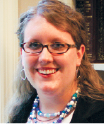By Melissa Wuske
 Last year my church started using small group discussion occasionally during Sunday morning worship. Over time it became clear that people had varying views on this format. Some loved it. Others were reluctant to even come to church if they knew there’d be small groups: the interpersonal anxiety was too much or the stress of personal crisis was too overwhelming or it took a lot of energy and didn’t pay off. There was a third group: the people who insisted the non-small groupers needed to tough it out. Of all the responses, this one stung me.
Last year my church started using small group discussion occasionally during Sunday morning worship. Over time it became clear that people had varying views on this format. Some loved it. Others were reluctant to even come to church if they knew there’d be small groups: the interpersonal anxiety was too much or the stress of personal crisis was too overwhelming or it took a lot of energy and didn’t pay off. There was a third group: the people who insisted the non-small groupers needed to tough it out. Of all the responses, this one stung me.
Unity and Change
Fortunately the leaders responded compassionately. They saw that members of the congregation were hurting and alienated. For the health and wholeness of these individuals and the congregation, they reduced the frequency of small group discussion and made sure there were options in place so people could interact in less painful ways.
When there’s a goal in mind, we sometimes run others over in the name of efficiency or “this is just how we do things.” God wants people to grow beyond where they’re comfortable now, but he doesn’t bulldoze them in the process.
Certainly decisions need to be made and held to—growth in Christ can be painful, and division is inevitable. But too often the church values conformity more than unity. It’s easier to explain away why we have to leave some people behind than to acknowledge that when we do, we leave behind pieces of the body of Christ.
Seeking Others’ Good
Seeking the good of others isn’t a fluffy, feel-good idea. It’s a countercultural, spiritual reality that we have to be vigilantly committed to. Even in our most benevolent moments, we see an us and them.
I like to think I help others because I’m able, but a Christ-centered attitude says I help because I need help too. The first attitude assumes I have it together and seeks to validate my reputation; the Christ-centered attitude acknowledges the daily reality of my brokenness. When I look through the eyes of others, through the eyes of Christ, are my actions really for others’ good?
Melissa Wuske is a freelance editor, writer, and the communications director for Stop Traffick Fashion
(melissaannewuske.com). She lives in Boston with her husband, Shawn.



Comments: no replies